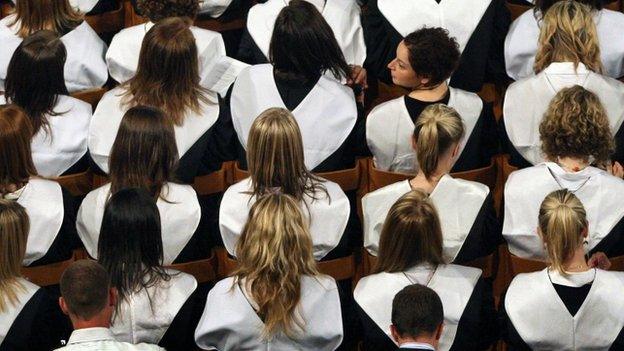Parents lose their car paying price of university
- Published

When you hear about someone getting their car repossessed, you wonder what kind of financial calamity must have hit them.
You might think about redundancy or illness. But not that their child has done really well and got into university.
The report on the BBC News website about worries about student living costs triggered a strong response, with warnings about families who were struggling.
The fierce political debate in England has focused on tuition fees. But overlooked has been a much more immediate issue for many middle-income families - the low level of loans and grants available to pay for rent and living costs.
Students get an annual loan of up to £9,000 to cover fees, but this goes directly to the university. For living costs, much less is available, with many students receiving loans of less than £4,000 for the year, with parents expected to pay thousands in up-front cash to fill the gap.
A family from Yorkshire got in touch with their deep anxieties.
'Isolated'
The first point they make is that they're not what anyone would call poor. Both parents are working full-time - the mother is a nurse and the father a customer services adviser.
But in England's student finance terms, it puts them into the bracket of top earners above the £42,611 threshold, so there are no grants available.
They say their daughter only has access to about £3,600 in student loans for living costs for the year.

More than 500,000 students were awarded a university place in autumn 2014
The rest of the financial burden falls to the parents - and according to the National Union of Students the typical cost of living for a student outside London is now £12,000 per year, leaving a shortfall for many families that can be more than £8,000.
The Yorkshire family, who want to stay anonymous for the sake of their daughter, say the cost is stretching them to breaking point.
"You feel isolated, people don't understand. You don't want to admit that you're struggling," says the mother.
"I suspect there will be many more people struggling, but not many will want to say."
Squeezed middle
The accommodation alone is more than the total their daughter receives as a loan - and her choice of university was determined by rent levels.
On top of living costs they had to pay for kit worth £500 and fund several months of unpaid internships. Their daughter is taking a course with a lot of weekly hours, making it difficult for her to get a job.
"There is a constant need for providing money.
"We're made to feel poor even though we're working full-time."

Students' annual living costs (outside London)
Rent £4,989
Food £1,954
Household goods £363
Insurance £42
Personal Items £1,917
Travel £1,705
Leisure£1,190
Total: £12,160
Source: National Union of Students

The mother says the student finance system doesn't seem to recognise the money pressures already facing parents. Many will still be paying off mortgages and have other financial commitments. Pay rises have been few and far between.
"It's a deep hole, and it's a very painful deep hole at times."
And when the money completely ran out it meant there wasn't any cash left to make the car repayments.
"It was her first year at university and we were really struggling."
It's not what she expected in her late-40s.
"You could get bitter," she says.

The financial anxiety can feel like a "very painful deep hole", says a mother struggling with university costs
What annoys the family is the feeling that their problems are not being acknowledged. The very poor are able to access grants, bursaries and higher levels of loans - and the very rich can afford not to worry about the extra cost.
It's galling to them that as they are scrimping and worrying, the student finance system brackets them with the super-rich.
In terms of access to grants, a couple earning £22,000 each are treated the same as those earning £200,000 or £2m.
She thinks the amount that students can borrow for living costs is unrealistically low and as students are adults their borrowing should not be linked to their parents' income.
And even more troubling for them is that they have another child who will soon be applying to university. As well as being proud, it makes them fearful of the cost.
It's not a sob story - because these are families with good jobs and children who are doing well. They are part of an aspirational tide of increasing numbers going to university. But they feel they are in an impossible position.
Fair share?
The response from emails suggests they are not alone. A recurrent theme is that no-one admits that it's parents who are subsidising the system and that it's middle earners who are hit the hardest.
The biggest slice of student funding goes straight to universities, in the form of tuition fee loans. And parents have complained that the funding for living costs has become something of a poor relation.
Are these legitimate complaints? Or should parents accept that they have to pay their fair share? Record numbers are applying to university suggesting that cost is not a deterrent.
It's worth taking a closer look at the figures underlying student funding. Because there does seem to be a reality gap.
"Depending on their income, parents may have to contribute towards the living costs of their student children," says the information from the student finance system.

The NUS says average living costs are £12,000, but some students have loans fixed below £4,000
The maximum loan for a student outside London next year will be £5,740 - with more than a third of this means-tested on parental income.
Once parental income reaches just over £62,000 (or £31,000 each) their children will only be able to borrow £3,731 per year. This reduction in loan is based on an "assessed contribution" from parents of £2,009.
But does this add up? Would even the most frugal students, with loans and assessed parental contributions put together, really be able to survive on £5,740?
Whatever the theoretical "assessed contribution" used for these calculations, the amount paid by parents earning £25,000 or £35,000 per year is likely to be much higher.
Targeted support
A Department for Business, Innovation and Skills spokesman said that student funding is targeted at those most in need - and is not expected to replace the support of parents.
"All eligible students are guaranteed a minimum amount of maintenance loan. Additional maintenance grant and loan support is means-tested to ensure those students facing the greatest financial barriers receive the most support. This plays an important role in widening participation in higher education.

Accommodation is often the biggest expense in student living costs
"Maintenance grants and loans, provided by the government, are intended as a contribution towards a full-time student's overall living costs. A range of additional support and bursaries are available from both government and universities to ensure that a university education remains open to all."
But Carl Lygo, vice-chancellor of BPP University, says the pressure on living costs raises wider issues.
First of all, he says, it challenges the assumption that students should study away from home, when accommodation is the biggest extra expense.
He also says universities, unable to increase tuition fees, are looking to make a bigger return on their investments in accommodation, which pushes up rents.
"Parents end up being locked in a vicious cycle of peer expectation that their children are somehow missing out on the rites of passage of education if they don't leave home and live in expensive halls of residence."
It raises the case for more flexible forms of higher education - such as higher-level apprenticeships linked to part-time degrees or undergraduate courses running through the summer so they can be completed in two rather than three years.
The demand for university is rising - and it's something that is seen as a benefit to individuals and the economy. But the question of paying for it remains unresolved.